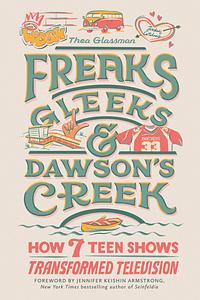Take a photo of a barcode or cover
342 reviews for:
Freaks, Gleeks, and Dawson's Creek: How Seven Teen Shows Transformed Television
Thea Glassman
342 reviews for:
Freaks, Gleeks, and Dawson's Creek: How Seven Teen Shows Transformed Television
Thea Glassman
One word… Nostalgic!
I flew through this non-fiction book based on some of my favorite TV shows from the 90s and early 2000s. I mean come on Fresh Prince of Bel Air, My So Called Life, & The OC just to name a few. Thea takes you on a behind the scenes tour sharing info an insider would only know! A quick step back in time that is
I flew through this non-fiction book based on some of my favorite TV shows from the 90s and early 2000s. I mean come on Fresh Prince of Bel Air, My So Called Life, & The OC just to name a few. Thea takes you on a behind the scenes tour sharing info an insider would only know! A quick step back in time that is
I really enjoyed this audiobook. I was an avid viewer of Glee while it was on air and My So-Called Life years after. Loved Fresh Prince. The other shows I passed on while they were on. Regardless I really enjoyed hearing about the shows and the impact they had during after their times. I also liked learning about the development of the shows. I don’t know if I’ll go and watch the other shows mentioned, but maybe now I’ll consider it. Well. Other than Dawson’s Creek. That’s just not my jam.
informative
medium-paced
informative
reflective
medium-paced
fast-paced
Having grown up on all seven of these shows, I am exactly this book's target audience. It's crazy that some of these great shows had such short runs, but this book explains why (money -- there was a time at which teenagers were not considered to have lucrative purchasing powers).
Also, lots of tea about casting decisions, relationships, etc.
I don't know how Buffy the Vampire Slayer didn't make the list (teens saving the world! the worst morning after! sapphic storyline!) but I still enjoyed the examination of the shows included:
Also, lots of tea about casting decisions, relationships, etc.
I don't know how Buffy the Vampire Slayer didn't make the list (teens saving the world! the worst morning after! sapphic storyline!) but I still enjoyed the examination of the shows included:
- Fresh Prince of Bel-Air
- My So-Called Life
- Dawson's Creek
- Freaks & Geeks
- The OC
- Friday Night Lights
- Glee
Really wanted to love this book (nostalgia!) but it read pretty flat. Some interesting details and behind-the-scenes info but just kind of meh.
After hearing so much about this book, I had hoped to like more. But the only chapters I was able to complete in their entirety were the ones on My So Called Life, Fresh Prince of Bel-Air and Friday Night Lights. I think I was hoping for more gossip than just a telling of how they were made, which probably says more about me than anything else.
This was such a great listen!
I've seen 4ish of the 7 shows mentioned in this book, but enjoyed learning about all of them.
I've seen 4ish of the 7 shows mentioned in this book, but enjoyed learning about all of them.




